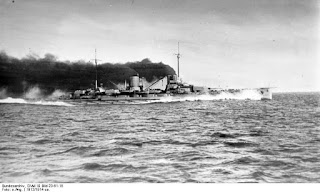 |
| What was left behind on the Gallipoli Peninsula? |
Throughout 1915, the Allies lack of success at Gallipoli was damaging to their prestige - particularly to Britain's - and this impacted adversely on the finely balanced stances taken by the various players in the Balkans. The short term aftermath saw Bulgaria confirmed for the Central Powers as a belligerent, and a major contributor to the destruction of Serbia.
Greece held more closely to her position of neutrality, notwithstanding the efforts of Anglophile Prime Minister Venizelos and the obvious destruction of Serbia taking place near to her borders. The Greek King (related by marriage to the Kaiser) was determined to keep his country neutral, and once again Venizelos lost his office as PM. There was a mistrust of the Allies, both of their intentions and of their ability to deliver victory. Even the offers of Cyprus and Smyrna to the Greeks by Britain could not induce them to declare. Buchan's summary: "We underrated the importance of the Balkans from the start. History will record that our difficulties were great, but that they were surmountable, and that they were not surmounted"
Turkey, emboldened by its success in defending the Gallipoli peninsula, and supported and reinforced by Germany, had new confidence in Mesopotamia (see next post) and was able to divert more forces to this region and the Trans-Caucasus.
Back in London Churchill, having resigned from the Government, wasted no time in enlisting with his regiment, the 2nd Battalion of Grenadier Guards and crossing to France to familiarise himself with the trench warfare on the Western Front. Kitchener's reputation had been badly damaged by the indecision he had displayed throughout the campaign, and significant changes to the conduct of the war by the British Government would be made by the end of the year. Hamilton's and other senior Generals' conduct would come under close scrutiny in the Dardanelles Commission of 1916, and for many their careers would not recover.
There was now a strategic vacuum left by the Gallipoli failure. Only the Salonika reinforcement now stood as an Allied base in South Eastern Europe. The Western and Eastern Fronts became again the areas where decisive events would most likely occur, but with hardening positions on both sides, a long war of exhaustion was probable.
All of this had an impact on the neutrality of the USA. In the short term, the Germans took full advantage of Britain's embarrassment, with propaganda, pro-German agitation and more overt diplomatic efforts to persuade the Americans of the hopelessness of the Allied cause. This prompted John Masefield's book Gallipoli as counter propaganda to the the Germans, and he promoted it with a lecture tour of the USA.
What if? And yet, history would have been so different if....
Churchill in particular always held to his view that implementation was wrong, not strategy. Even if he bears much of the responsibility for poor implementation, there are fair 'what if' points, since it is now clear that the Turkish defences were close to collapse on several occasions, and that a better conducted campaign by the Allies could have forced the Straits. Inter alia, IF:
- the initial naval bombardment had been better supported with land forces, surprise may have paid off
- the Cape Helles landings had been better conducted Krithia would have been attainable
- more reinforcements had been provided earlier in several cases, particularly the dispatch of the 29th Division in February, and for the Suvla Bay landing arriving belatedly in July
- Stopford had acted with greater urgency at the eventual Suvla landing in August
- the Greek offer of its army and alliance had been accepted in 1914
- Britain's subsequent diplomatic efforts in the Balkans had been more fruitful
- Keyes and de Wemyss's last proposals for naval action rather than evacuation had been accepted
 |
| Admiral Sir Archibald 'Arky-Barky' Milne. "The Admiralty pays me to be an Admiral, it does not pay me to think" (allegedly) |
 |
| SMS Goeben, nemesis of Milne and Troubridge |
Turkey was slightly bounced into allowing them free passage, and to enter the Black Sea. The Germans promptly turned over these ships' flags (though not their crews) to Turkey, instantly compensating for Britain's refusal to provide Turkey with her two commissioned battleships, impounded on Tyneside. This single act pushed Turkey into relinquishing her neutrality and joining the war on the side of Germany. Troubridge later faced, but escaped, court-martial for what many viewed as an act of cowardice.

No comments:
Post a Comment